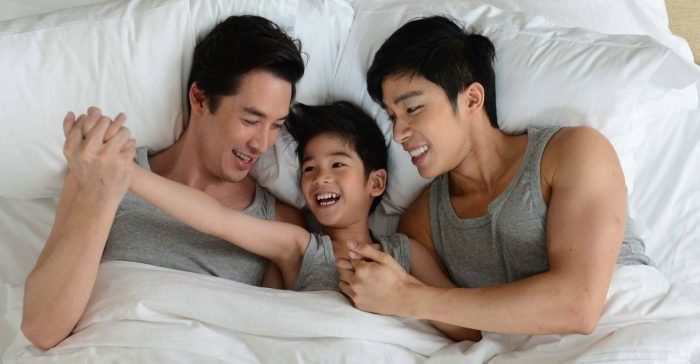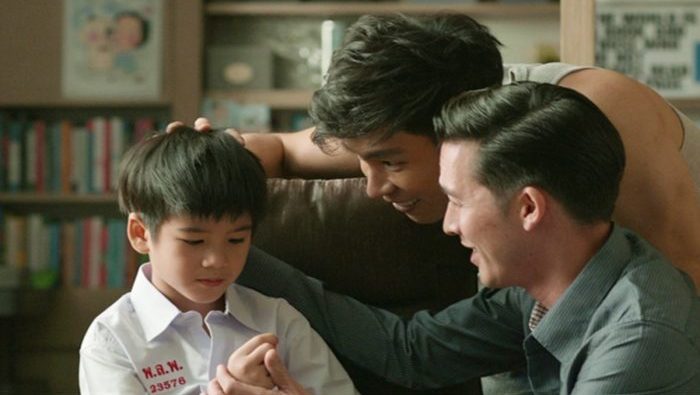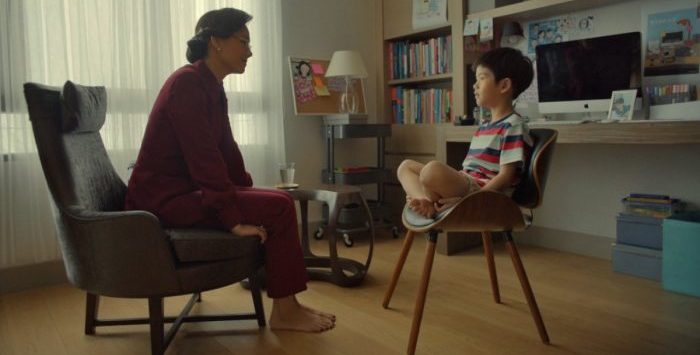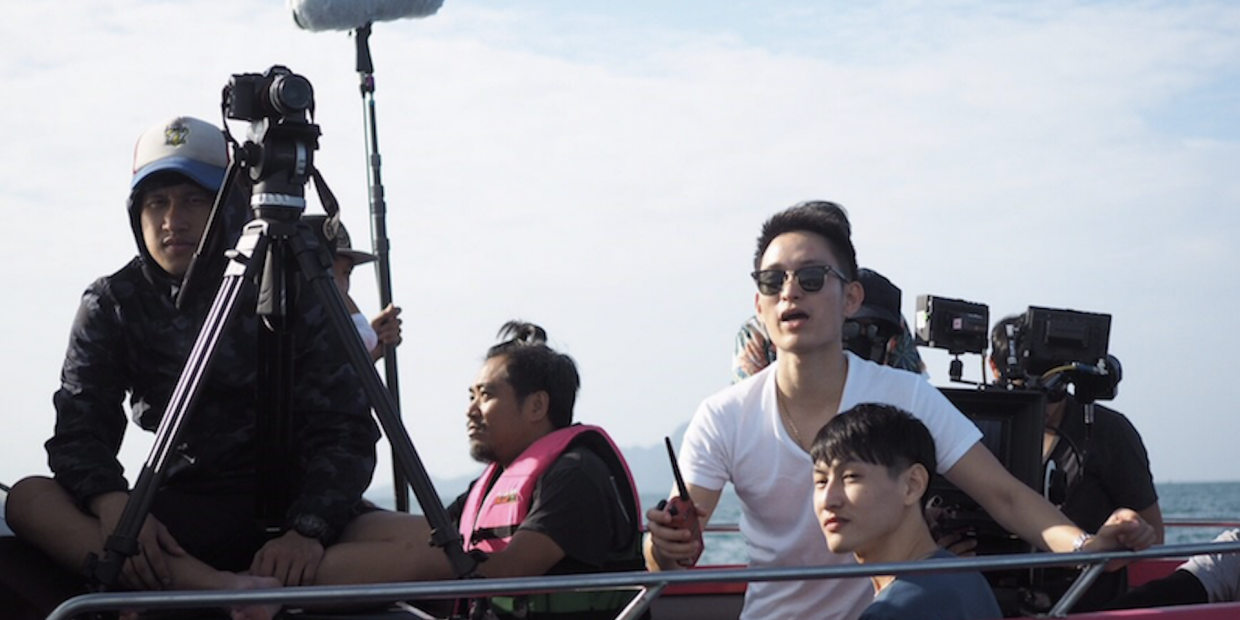Interview translated by
Tackling a subject oft-neglected by cinema in general but Southeast Asian cinema in particular, Palatpol Mingpornpichit’s Fathers is the sweetly simple tale of gay couple Phoon (Asda Panichkul) and Yuke (Nat Sakdatorn), their adoptive son Butr (Arituch Pipattangkul) and the various social obstacles and moral questions that emerge from the Phoon and Yuke’s experience of parenting in a nation where same-sex couples still strive for legal equality.
Speaking to FilmDoo, Thai director Mingpornpichit discusses Fathers and the cultural context it was born from.
What inspired you to make Fathers? Were there any personal experiences that compelled you to direct this film, or was it meant more as a response to wider political and sociocultural issues?
To be honest, the inspiration comes from my long desire to have children. I am very fond of children and I adore them. I have been with my partner for 12 years now and we have been fortunate in that the people around us have always been accepting and supportive of us. It is due to this love I have for children that, when I see the children of others, I feel like having some children of my own. I want to raise them, hold them, hug and play with them, and take care of them.
Nevertheless, despite how much I want to have them, I have never found the courage to actually have children because I am afraid of that responsibility for another person’s life. I think it is not easy to raise a child, let alone for them to grow up without feeling alienated, especially in Thai society where we like to make fun of and ridicule one another.

Would you regard these moral questions faced by the two fathers of how best to raise their child as a universal struggle of parenthood?
I feel you should raise the child as normally as possible. Explain everything truthfully as a matter of fact, without bias and without forcing certain ideologies onto them. Every human being deserves to have a reasonable explanation for everything and that also goes for children. Therefore, educate children with logic and reasoning to help them be considerate and make proper judgements. It is these considerations that help children grow up to become reasonable adults.
Butr’s classmates initially seem unconcerned by the boy having two fathers. It is only later that we see Butr confronted by the son of a narrow-minded parent. Do you think that prejudice is something that is passed from generation to generation, rather than simply coming about by human nature?
Science can explain many things from our genetics. However, in terms of sociology, I believe all humans being are bought up by certain parenting or within a certain environment. Whoever grows up with certain types of people, attitude or behaviours are highly influenced by those ideas and judgements – especially first-born children who tend to take after the role models of their parent or guardian as some form of hero to look up to for ways in which they learn how to live.
Neither of us know the differences between what is right or wrong, good or bad until we learn from widening our worldly circles and expanding upon the society in which we live in. However, I believe growing up amongst people with positive influences will enable a child to develop their vision greatly. Therefore, educational institutions and the mass media also play a vital role in influencing our children, following the importance of the family unit.

Would you say that Thailand is more prolific in its production of local LGBT cinema than other regions of Southeast Asia?
Yes, within the last decade Thai society has begun to produce more and more films on LGBT issues. This is a refreshing change from the past, in which the LGBT roles were limited and were only colourful supporting characters, or reduced to archetypes such as “the fool” for comic relief or the trouble maker in drama series or in local movies. But recently Thai society has become more accepting even of LGBT couples. There have also been more appearances in the mainstream media. This can be seen from the many Thai actors who are now well-known and famous for their same-sex couple roles or characters confused about their sexuality. So many young actors are now ready to play these roles (whether or not they themselves are from the LGBT community) to give themselves that extra edge in the world of social-media and bring them much fame and fortune.
But it’s undeniable that many of the roles still being offered through the media, especially on local Thai television, are exaggerations or careless portrayals in overbearing contexts, which only serve to put the viewer in a fantasy world. Therefore, I must admit that it is still difficult to find the existence of many other contexts of LGBT characters within Thai society that are more true and accurate representations of someone from the LGBT community. Many LGBT drama series and movies in Thailand still place too much emphasis on storylines that are sold on romantic love and erotic love. Thus, many Thais have a common misconception that an LGBT movie is pornographic rather than a love story about LGBT relationships with many dimensions, no different from heterosexual relationships.
The LGBT media in Thailand outnumbers many of our Southeast Asian neighbours. Maybe this is because Thai society is not a serious one. We are not serious about the regulations. We are not serious about freedom and democracy. It is difficult to define our core values and principles, when we were never so rigid about them. The media picks up on an LGBT story presented plainly (focusing on sexual elements) in order to push its sales. These stories are still being mass-produced and commonly pop up in storylines in Thai society. So for me, the quantity is not as important as the quality of the issues or content discussed. In films and drama series, I would like to present LGBT characters in other aspects of life, very much like their heterosexual counterparts. A gay film is not always pornographic, it doesn’t need to only focus on sex, but this is still the common image by which LGBT films are perceived.

Do you feel optimistic about the future of LGBT life in Thailand, in terms of both legal and sociocultural acceptance?
Although LGBT groups in Thailand have more freedom of expression than many Asian countries, it cannot be denied that the traditions of making fun, teasing, or the use of slang, implies that there are still boundaries that make homosexuality a taboo that needs to be pushed. Stereotypes still need to be broken – and that also goes for portrayals of LGBT in the main media headlines themselves.
I still believe that it is difficult for the Thai government to push or focus on LGBT issues, whether this is an elected or a military-based government, because every government still pursues a conservative policy, with respect for the elite prioritised over dignity and human rights. Many times legislation was proposed to the House of Commons. This legislations was neglected and eventually dismissed. This is why I say that Thai society is not a serious one, both in terms of regulations and freedom, or lack thereof. Everything vaguely drives Thai society into a type of informal acceptance but there are never any official laws to support them.
Are you working on any new projects at the moment?
Right now we have a plan to make a thriller film that reflects Thai society but it may be a while in the making because raising funds is not an easy task for any independent director in Thailand.
I would like to add something: The name ‘Butr’ means ‘son’ in Pali, which has been borrowed for many centuries into the Thai language and is still widely used in Thai society today, especially within an official context.





